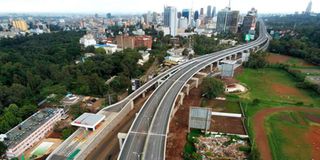Here is the road to Kenya’s economic recovery

Nairobi Expressway along Waiyaki way, Westlands. The expressway will help in reducing traffic jam in the capital city.
Kenya, in spite of being a market economy has not been able to shake off heritage controls, which throttles growth. At the beginning of 2020, the country had the third biggest economy in sub-Saharan Africa coming behind Nigeria and South Africa.
If we look back, as of September 2018, indications of economic growth and monetary possibilities were glowing due to extensions in the broadcast communications, transport and development areas and recuperation in agribusiness. These enhancements have been upheld by an enormous pool of professional and skilled workers. There is an irrefutable level of IT education and development predominantly among youthful Kenyans.
Until the Covid-19 pandemic, Kenya was one of the quickest developing economies in Africa. During 2020, the nation progressed to 56th place among 190 economies in the World Bank’s 2020 Doing Business survey, which is an improvement from position 61 in 2019 and position 80 in 2018.
Compared with its neighbours Kenya has a very much evolved social and actual foundation. The latest reports by the Kenya National Bureau of Statistics (KNBS) indicate that the country's economy grew 7.5 percent in 2021 after a decline in 2020. This development was principally driven by the revival of key sectors from the Covid-19 pandemic and a sound macroeconomic environment.
High energy prices
Other significant drivers of last year's growth were manufacturing contributing 6.9 percent, wholesale and retail trade contributing 7.9 percent, and transport and storage contributing 7.2 percent. The inflation rate has reportedly eased during the first quarter of 2022, but it is likely to rise in the second and third quarters of the year on account of high energy prices as well as an increase in prices of other commodities including food.
Why is Kenya seen as an expensive place to do business? Is it because of perceived political uncertainty? Relatively low foreign direct investment? Interrupted supplies of essentials including electricity and water? Perhaps a mix of all the above. Local manufacturers such as millers whose power usage is very high are crying over the high cost of production in their industries and in factories attributing this to the higher cost of electricity. This is the situation with most manufacturers. In order to beat the high cost of power, the government needs to empower local manufacturers to have access to green energy by effectively issuing licenses to plant solar panels in their factories.
Local manufacturers are going through lengthy processes to acquire those licenses and are asking the government to ease the process for local investors.
If we look at the financial front, Kenya keeps on confronting huge difficulties to maintainable and comprehensive financial development which have been exasperated by Covid-19 monetary disturbances and long-running difficulties. Numerous Kenyans experience the ill effects of monetary imbalance while a minority first-class proceeds to catch and adventure their work assets and openings.
Going forward, reducing high barriers to entry and regulatory requirements will be essential to cultivating competitiveness, principally in key sectors. Policies are also needed to reduce the gap between the formal and informal sectors.
The agricultural sector is the cornerstone of the Kenyan economy accounting for almost 33 percent of GDP. Horticulture utilises in excess of 40 percent of the absolute populace and 70 percent of the rustic populace. However rural profitability has weakened as of late. Numerous smallholder ranchers stay buried in destitution with restricted admittance to cutthroat business sectors, access to money, and improved innovation.
Economic growth comes from workforce and productivity. With an increase in the total number of work hours contributed by the economy by having more individuals employed while ensuring more productivity, the economy grows. Productivity increases when workers produce more than they did before. This usually happens either because of increased aptitudes of the workforce or because companies have invested physical capital such as tools, factories, and new equipment that enables employees to increase the output. In order to do so, it is natural that there is a need for finances. Having access to affordable financing and cash availability means companies have the means to acquire improved technology and expand with greater capital. All of these actions increase productivity, which grows the economy.
Stock market
Tax cuts and rebates also allow manufacturers and consumers to stimulate the economy themselves by imbuing it with more money. With our taxes consistently on the rise, this is a far cry from the suitable policies to encourage business setup, especially in the industrial or manufacturing sector.
What must also be taken into consideration is the stock market, which ideally is a sentiment indicator and can impact Gross Domestic Product. Most companies listed on bourses such as the Nairobi Securities Exchange are those which are leaders in their respective industries and therefore, their performance, and the demand for their shares can send several indicators about various aspects of the economy.
As the stock market rises and drops, so does sentiment in the economy. As this emotion or sentiment fluctuates, so does the spending by people, which ultimately drives GDP growth; it is argued, however, that the stock market can have both negative and positive effects on GDP. The NSE index has slowly started witnessing an upturn after a decline over the past two years. The share prices of blue-chip companies are underpriced, this is an ideal opportunity for investors to take advantage of the low market prices of certain high-yield blue-chip stocks, however, what actions are being taken to bring a revival of investments in the securities exchange?
Ideally, the vision which policymakers and the population should have is that whereby each Kenyan can profit from the nation’s turn of events, where they can develop their businesses, feed their family, and add to Kenya’s future.
Ritesh Barot is a business and financial analyst, humanitarian, conservationist, occasional artist, recipient of OGW honor. [email protected]





